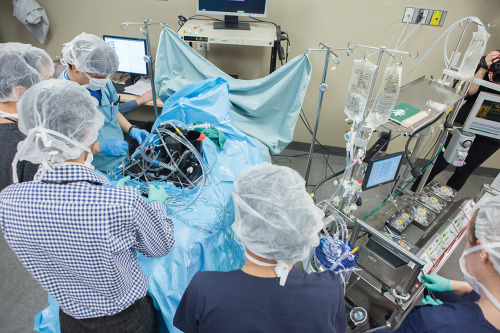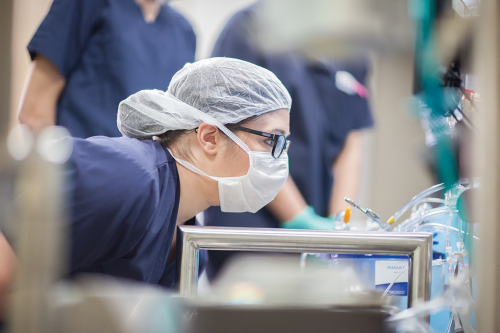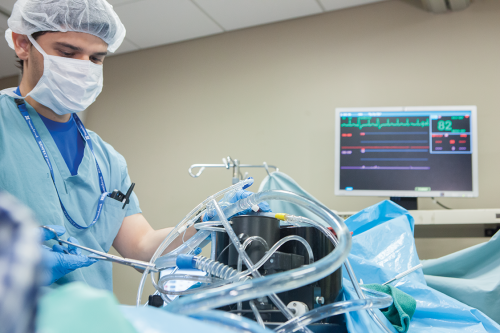Michener hosts an interprofessional workshop for Cardiovascular Perfusion Students and University of Toronto Cardiac Surgery Residents to recreate the operating room
 “We are ready to go on bypass,” the surgery resident calmly tells cardiovascular perfusion student Brigitte Chappellaz during a cardiac surgery simulation.
“We are ready to go on bypass,” the surgery resident calmly tells cardiovascular perfusion student Brigitte Chappellaz during a cardiac surgery simulation.
“Okay, going on bypass,” Brigitte responds as she prepares the heart-lung machine to initiate take-over of heart and lung function.
The heart is stopped, but it’s at that exact moment when the operating room comes to life. The heart-lung machine, operated by cardiovascular perfusionists, takes over the role of the heart and lungs during cardiac surgeries. These experts run the machine that effectively breathes and pumps blood for the patient, facilitating open-heart and thoracic procedures such as arterial coronary bypass, valve repair and replacements, transplants, among many more operations.
Having an in-depth understanding of all moving parts is a requirement for an integrated team to perform a safe surgery. It is so significant that cardiac surgery residents from University of Toronto’s Faculty of Medicine asked The Michener Institute to teach them how heart-lung machines operate and how they’re used in surgery.
At a recent interprofessional workshop held at Michener, University of Toronto cardiac surgery residents, University Health Network cardiovascular perfusionists and Michener cardiovascular perfusion students learned to work together like a finely tuned machine. In this operating room simulation, the cardiac surgery resident worked with the perfusion students and steered the team during the procedure.
 Initiated for surgery residents in 2013, this workshop has since been fully incorporated into Michener’s Cardiovascular Perfusion curriculum as part of a professionalism practice course.
Initiated for surgery residents in 2013, this workshop has since been fully incorporated into Michener’s Cardiovascular Perfusion curriculum as part of a professionalism practice course.
“Through these workshops, our students gain relatable interprofessional experience working with surgeons as they would in a real setting,” says Fiona Cherryman, Chair of the Critical Care programs at Michener.
Fiona handles the logistics of the workshop and explains that it benefits both Michener’s students and cardiac surgery residents. “The students and residents both have willingness and excitement to work with each other, which enhances their overall learning experience.”
“It helped me understand the importance of teamwork and communication in an operating room,” says Brigitte, reflecting on her training as a cardiovascular perfusionist. “This experience made it evident how important it is to be aware of what I do, how it impacts the surgical team and vice versa.”
During the simulation, the beep of the heart monitor was not the only sound you could hear. The room was busy with discussions between surgery residents, cardiovascular perfusion students and the workshop facilitator to understand how decisions are made, and what the best follow up steps were for this particular scenario.
“Clarity of communication is important for teamwork and a safe surgery,” says Fiona. “These workshops reinforce the idea that while we all have different perspectives, we are all working towards the best outcome for the patient.”

The follow up workshop with University of Toronto’s cardiac surgery residents was held on March 27 and provided training for emergency scenarios. Fiona notes that practicing emergency scenarios are important to prepare for crisis events through simulation.
“The emergency scenario workshop will prepare us for when an emergency happens in real life, so that we will be able to respond quickly,” said Brigitte, looking forward to the next collaborative interprofessional session. “When the team works and communicates together, we can be more efficient and provide the optimal safe patient care.”